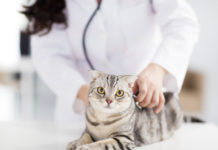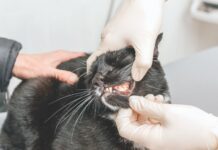Question: Ive been reading CatWatch for several years now, and I really enjoy the information it provides. I think youve helped me take better care of my cats, partly because you always emphasize preventive care. My veterinarian is a firm believer in routine diagnostic tests – even when my cat isnt sick. But I just read an article in the July issue of Consumer Reports entitled Veterinary Care without the Bite, and now Im a little worried that my veterinarian is recommending needless procedures just to pad his income.
Answer: Im a long-time fan of Consumer Reports (CR), and its rare for me to make a major purchase unless the product Im considering has lots of their famous little circles filled in with red. Theyve saved me a bundle over the years by steering me clear of inferior products.
The article youre referring to emphasizes ways to save pet-care dollars, and it includes many good preventative health care tips: schedule regular examinations, vaccinate only against the diseases necessary, spay and neuter, prevent and treat dental disorders, do exercise and dont overfeed, control fleas and ticks, dont let pets roam unsupervised outdoors, and prevent access to harmful household products and dangerous situations.
The one I like the most: Get a cat (CR claims that, in contrast to dogs, cats have fewer serious health problems and genetic diseases. Im not sure thats completely correct, but I wont argue). I agree with their encouragement to seek a second opinion when necessary (although my preference is to seek referral to an appropriate veterinary specialist rather than just going to another general practitioner).
And concerning people faced with a serious ailment in their cats: Get an estimate of all costs – surgery, rehabilitation, and lifelong medications. Ask your vet about the prognosis for survival and the pets quality of life after the treatment. The overriding decision should be based not on what medical treatments are possible, but on how well-off the pet will be during and after the treatment.
One of the things I value about CR reports is their emphasis on helping consumers receive the highest value for the dollar spent. Ive never known them to claim that the cheapest product is always the best product: There are always other considerations. So I was taken aback by the overall tone that veterinarians are out to cheat an unsuspecting public, and one way they do so is by recommending testing. Its a serious flaw, in my opinion, and even potentially harmful to feline health because it may discourage cat lovers from doing the best by their kitties.
Just a few statements that bothered me:
Vets…boost profits by ordering more lab tests, X-rays, and ultrasounds. Even if your pet is perfectly healthy, vets are now ready with a battery of tests, shots, and even X-rays for the annual wellness checkup…. (Hmmm…not every cat is going to need all this, but might it just be good preventative medicine in some cases?)
Vet charges can also be influenced by how much in college loans a newly minted vet has to pay off…. (I thank CR for bringing this up. The average educational debt load for new veterinarians – with over eight years of college and professional schooling on average – is in excess of $70,000 while their average annual starting salary is just a little over $40,000. This is a major concern within a profession that wants to continue to attract the brightest and best students. And it might not get that much better as they progress in the profession: The average income of veterinarians still ranks below other health care providers, seventh in line behind physicians, dentists, podiatrists, optometrists, chiropractors, and pharmacists.)
…how new or fancy the vets office is… (Does new or fancy mean the best equipment, facilities, and staff the veterinarian can afford so she can deliver quality health care to her patients?)
I dont personally know all the 70,000 or so veterinarians in the country, but I believe that the overwhelming majority are simply trying to help people take good care of their pets. You can be both a wise shopper and a good steward of your cats health by talking with your veterinarian, asking questions, and making sure you understand what is being suggested and why. Hopefully CatWatch can benefit you by helping you know what to ask. For additional information, see www.avma.org/.
Preventative medicine is good medicine and economical medicine. When my physician says I need to have a colonoscopy to make sure I dont get colon cancer, I doubt that shes trying to pad her income. Perhaps shes just trying to keep me healthy!



